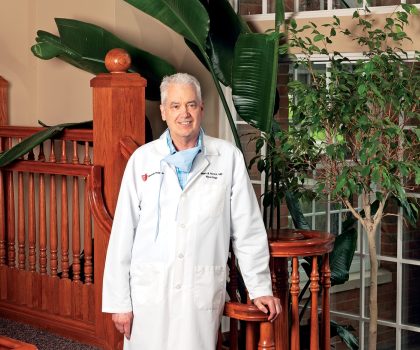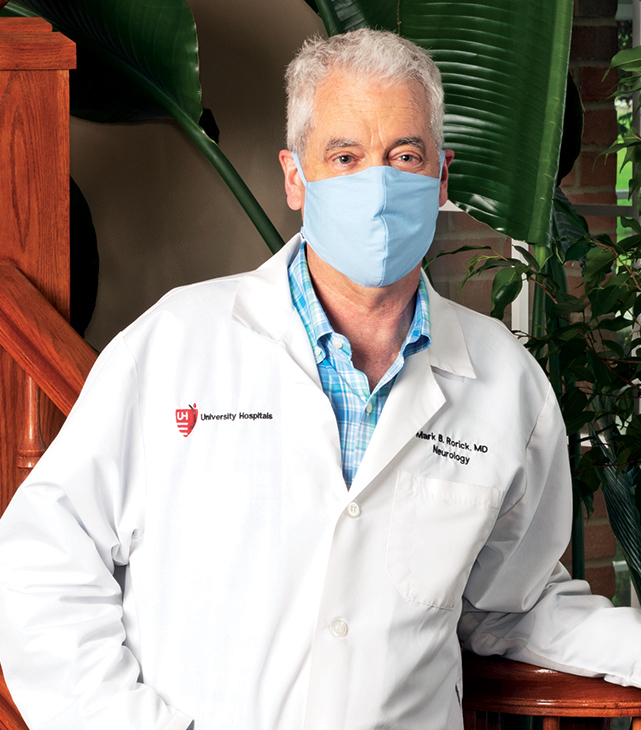When someone has a stroke, every second counts

By Ken McEntee
“Time is brain” is a popular adage that emphasizes the importance of every second that passes after a person has a stroke.
“The longer you wait to get treatment, the more of your brain that is likely to be damaged—and the damage could become permanent,” says Mark Rorick, MD, neurologist and stroke director at University Hospitals Geauga Medical Center.
Stroke—a disease that affects the arteries leading to and within the brain—is the fifth leading cause of death and a leading cause of disability in the United States, according to the American Stroke Association. A stroke occurs when a blood vessel that carries oxygen and nutrients to the brain is either blocked by a clot or ruptures. When that happens, part of the brain cannot get the oxygen it needs, and brain cells can die.
“When you have symptoms of a possible stroke, you should immediately call 911 and be taken to the emergency room,” Dr. Rorick advises. “That’s the fastest way to get treatment.”
Paramedics can save precious time by starting the initial triaging and alerting the hospital that a stroke patient is on the way, he says.
“FAST” is a useful acronym that can help you remember some common stroke symptoms:
- Facial drooping
- Arm weakness
- Speech difficulty
- Time to call for help
However, Dr. Rorick cautions, there are other symptoms as well.
“Other symptoms can include double vision or loss of vision, or difficulty walking,” he says. “I’ve seen people actually have a stroke and their only problem is they can’t walk or they’re off balance. Some people experience clumsiness with their hands.”
Another symptom, he adds, can be “the worst headache of your life. I’m not talking about somebody who has a history of migraines. I mean somebody who rarely gets headaches and has an excruciating headache that could be a sign of bleeding in the brain.”
Because time is critical, Dr. Rorick cautions, don’t wait around to see whether symptoms get worse—or even go away.
“Sometimes symptoms seem to subside, but you may have experienced a transient ischemic attack (TIA)—or what’s known as a mini-stroke,” he says. “People who have TIAs are more susceptible to strokes down the road, so they should still go to the emergency room for assessment. Don’t wait to make an appointment with your family doctor.”
At the hospital, blood tests, CT scans and other diagnostic tools may be used to diagnose a potential stroke patient. Ischemic strokes—those that are caused by arterial blockages—can typically be treated with an intravenous clot buster called TPA (tissue plasminogen activator) if it can be administered within three, sometimes four and a half, hours after the stroke occurs, Dr. Rorick explains.
UH Geauga Medical Center is a primary stroke center that is able to do most stroke treatment procedures. If a patient requires a complex treatment, such as using a catheter to remove a blockage in the brain, he or she can be quickly transported by helicopter to the main UH campus, UH Cleveland Medical Center, Dr. Rorick says.
“Nobody wants to go to the ER, but you shouldn’t take chances with a stroke,” he says. “You can be assured that we take every precaution to ensure that our facility is clean and safe for all of our patients and staff.”

It is safe to come to the hospital amidst the coronavirus pandemic. UH Geauga, like the entire University Hospitals system, is extremely active with universal screening, masking and social distance policies. Cleaning and sanitation are 24-hour-a-day activities here. Telehealth appointments are also available to ensure you’re keeping up to date with your preventive health care needs.
University Hospitals Geauga Medical Center provides world class medical care in an intimate, close-to-home environment. You can schedule an appointment with a medical professional by calling 440-901-0953. UH Geauga Medical Center is located at 13207 Ravenna Road, in Chardon. You can learn more by visiting UHHospitals.org/locations/uh-geauga-medical-center.
